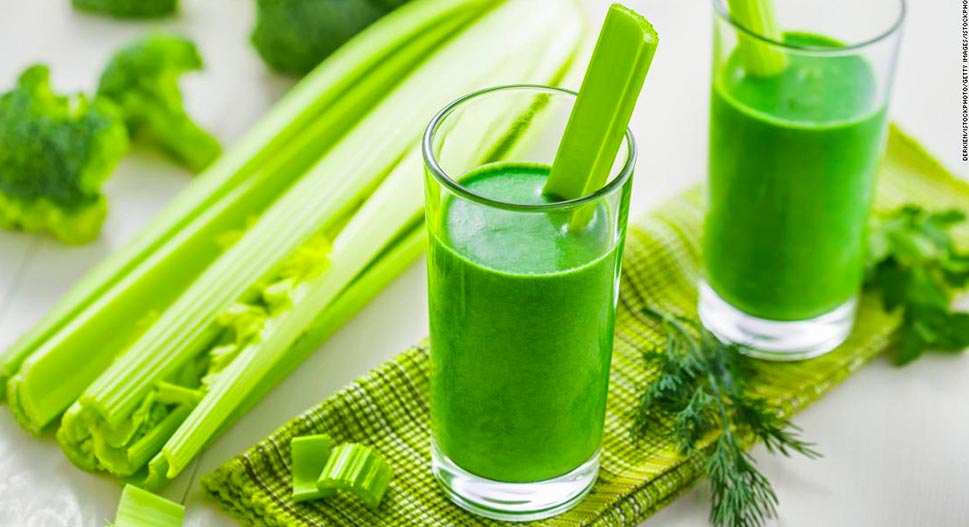
Celery. It’s hardly the most exciting of vegetables, but juiced is worthy of no less than 70k posts on Instagram with people claiming it helps with everything from eczema to cancer.
The celery juice craze: where did it all begin?
The celery juice craze was started by Anthony William (also known as the Medical Medium) who claimed that in one week of its use you are able to improve digestion, reduce inflammation, detox your liver, eliminate migraines, cure depression, and heal you from cancer.
To reap the benefits, he recommended that celery be juiced (no pulp), consumed on its own (no lemon or ice) in the morning, on an empty stomach first thing at least 30 minutes before breakfast. He said the real benefit of celery juice was due to the undiscovered “cluster salts”, which are not bioavailable unless juiced and consumed on an empty stomach.
What does the science say?
If you're wondering if there's any scientific evidence to support Andrew William’s claims about celery, the answer is no. In fact, “cluster salts” aren’t actually a thing.
Antioxidants in celery have been studied, although there are only a very few studies on this. It’s important to note that these antioxidant studies were done in vitro, which is the weakest level of scientific evidence.
One of these studies looked at inflammation and compared the concentrates of the flavonoids phytochemicals in celery juice with those in parsley. Interestingly, fresh parsley juice averaged 281 mg flavones/100 g and fresh celery juice, 28.5 mg/100g, suggesting that parsley juice actually tops celery juice in terms of antioxidant capacity!
However, as the old saying goes; “absence of evidence is not evidence of absence”. Whilst there is no strong scientific evidence to validate the bold claims being made about celery, there are still thousands of people who are giving anecdotal evidence about its benefits.
It could be the placebo effect (powerful!) or simply that along with celery juice people are changing their lifestyles, which will always have a positive effect. At the end of the day, eating celery as part of a varied, balanced diet is a great thing to do. Just don’t guzzle down litres upon litres of its juice and expect any miracles.

What are the known benefits of celery?
-
Nutrient-rich
Despite being considered a pretty boring veggie, celery is actually very rich in nutrients. It is low in calories (one medium stalk has about 6 calories), low in sugar, low in fat, high in fibre and rich in vitamins and minerals such as vitamin K, vitamin C, folate, calcium, magnesium, sodium and potassium.
-
High in antioxidants
Like many other vegetables, it is also high in antioxidants. Antioxidants are nature’s way of protecting the body from oxidative stress caused by free radicals. Free radicals occur naturally within the body. They are produced as a consequence of your body constantly reacting with oxygen as you breathe and through cellular metabolism. Free radicals interact with membranes, proteins and the DNA within cells to cause oxidative damage. Oxidative damage has been implicated in the cause of many diseases, such as cancer and Alzheimer's and has an impact on the body's aging process.
Is juicing celery better than eating it?
When you juice a vegetable, you’re basically concentrating the nutrients into a sippable form and therefore bypassing the energy-intensive and important process of digestion. The important thing to remember about juicing is that you are throwing away the fibre. Dietary fibre is what your gut bugs thrive on. One reason whole fruits and vegetables are recommended over their juice counterparts is that the whole foods contain fibre.
Like other vegetable juices, celery juice is a convenient way to increase your daily vegetable consumption. It's not necessarily “healthier” than whole celery, but if you like the taste better than that of celery stalks, it could be a choice for you. You also might enjoy blending it will a mixture of other green ingredients, such as apple and spinach, to make a refreshing juice. However, do remember that it's easy to over-consume juice and fall prey to added sugars of fruit and other ingredients, particularly in shop bought blends.
Conclusion
Drinking celery juice is unlikely to do you any harm, unless you have an allergy or it interacts with certain medicines. So if you enjoy the taste or feel that it adds to your life then go ahead and drink it.
What is far more important is that you’ve got your healthy eating basics down as a lifestyle thing, because one healthy food in an otherwise unhealthy diet isn’t going to win you any points.
References
Available on Request
- Hostetler G, RiedlK, Schwartz S. 2012. Endogenous enzymes, heat, and pH affect flavone profiles in parsley (Petroselinum crispum var. neapolitanum) and celery (Apium graveolens) during juice processing. J Agric Food Chem. 202-8





























































